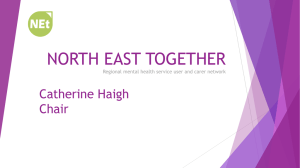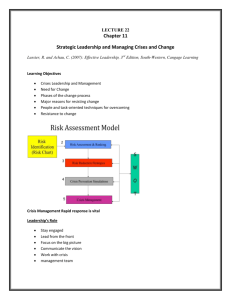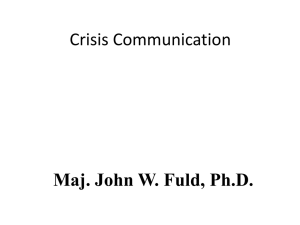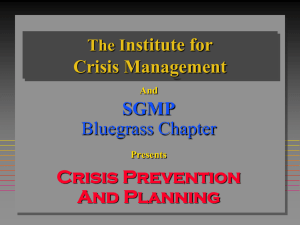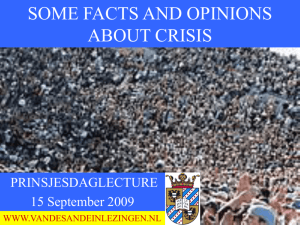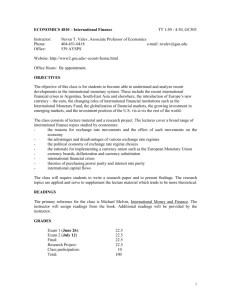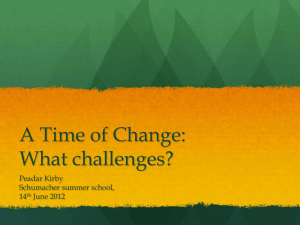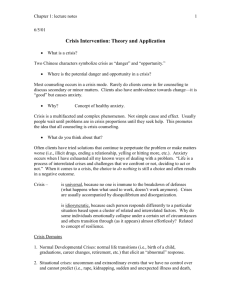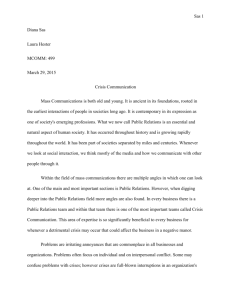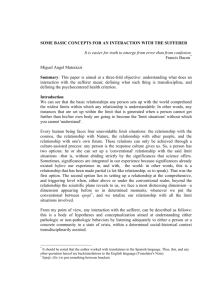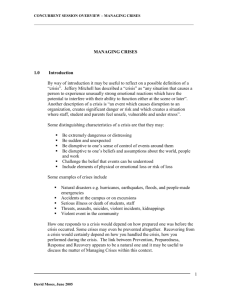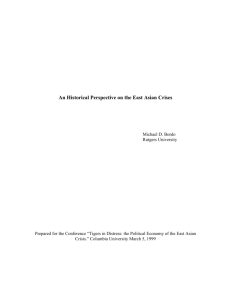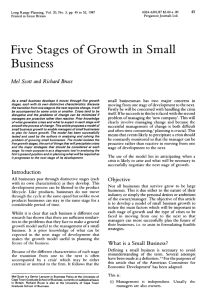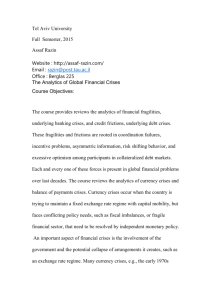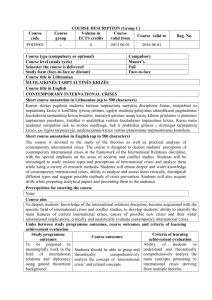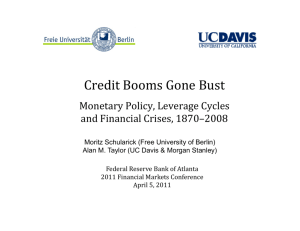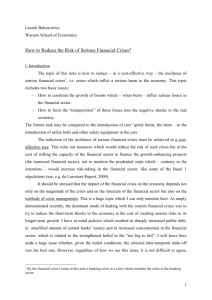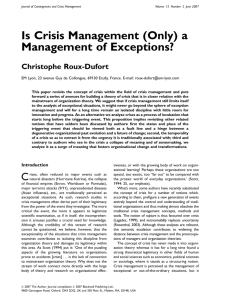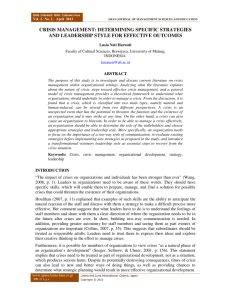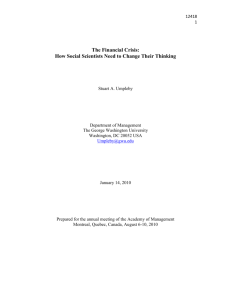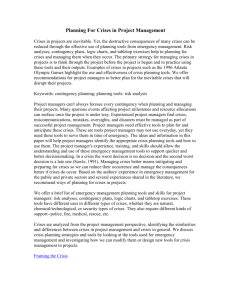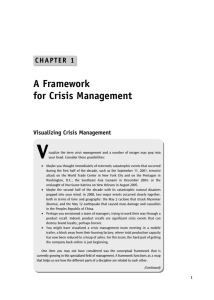Crisis Management-MGMT629 LECTRURE#7 CRISIS DECISION “In
advertisement
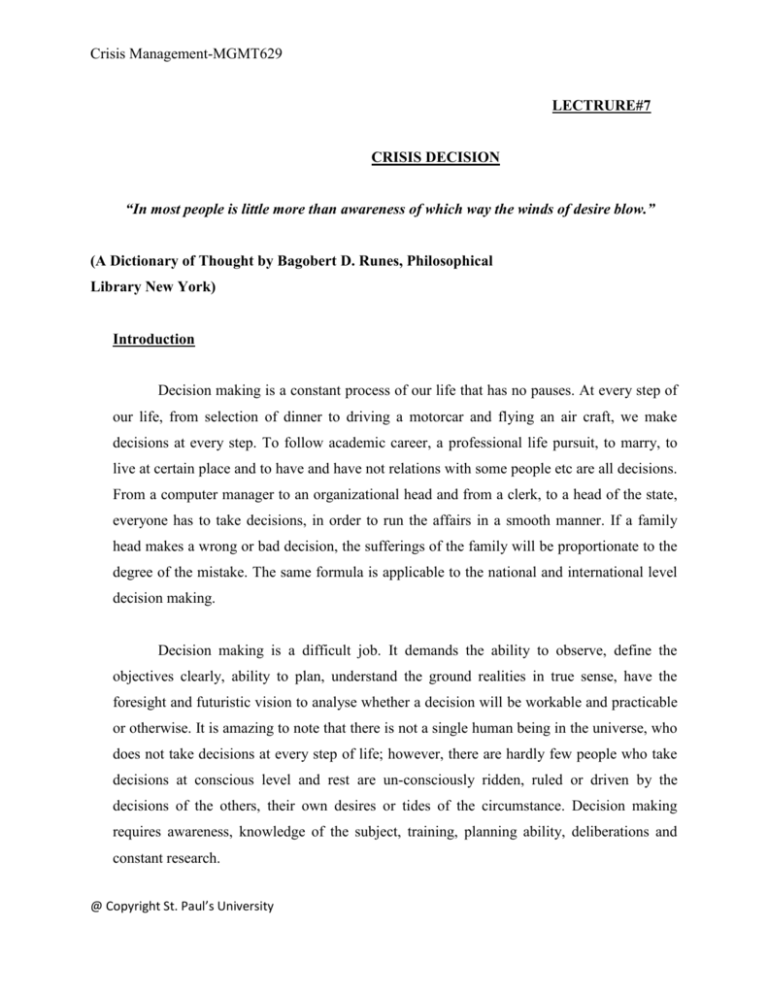
Crisis Management-MGMT629 LECTRURE#7 CRISIS DECISION “In most people is little more than awareness of which way the winds of desire blow.” (A Dictionary of Thought by Bagobert D. Runes, Philosophical Library New York) Introduction Decision making is a constant process of our life that has no pauses. At every step of our life, from selection of dinner to driving a motorcar and flying an air craft, we make decisions at every step. To follow academic career, a professional life pursuit, to marry, to live at certain place and to have and have not relations with some people etc are all decisions. From a computer manager to an organizational head and from a clerk, to a head of the state, everyone has to take decisions, in order to run the affairs in a smooth manner. If a family head makes a wrong or bad decision, the sufferings of the family will be proportionate to the degree of the mistake. The same formula is applicable to the national and international level decision making. Decision making is a difficult job. It demands the ability to observe, define the objectives clearly, ability to plan, understand the ground realities in true sense, have the foresight and futuristic vision to analyse whether a decision will be workable and practicable or otherwise. It is amazing to note that there is not a single human being in the universe, who does not take decisions at every step of life; however, there are hardly few people who take decisions at conscious level and rest are un-consciously ridden, ruled or driven by the decisions of the others, their own desires or tides of the circumstance. Decision making requires awareness, knowledge of the subject, training, planning ability, deliberations and constant research. @ Copyright St. Paul’s University Crisis Management-MGMT629 Father of the nation Quaid-e-Azam Muhammad Ali Jinnah said:“Even a, bad decision, is better than no decision”. “Think over hundred times before making a decision. Once made (decision) stick to it.” To understand the process of decision making it is very important to understand the true meanings of the word “Decision”. Various definitions and perceptions of “Decision” in the reference books, have been briefly listed, in the following paragraphs; WHAT AFFECTS THE DECISION MAKING? It must be kept in mind that decision making is a difficult job. It involves many factors and dimensions. In the process of decision making one has to guard against many distractions and ensure that the ground realities are not lost sight of. Some of the factors which can affect the decision making are given below; a. Perception (1). We see what we want to see. It is a very common tendency that one wants to see, what he likes to see. It is called ‘wishful thinking’. This single syndrome can lead to a disastrous or an absolutely wrong decision. It must always be kept in mind that facts and figures, ground realities, correct data and visible factors are the essential ingredients for making a correct decision. Throughout the process of decision making, the emotional and psychological temptations, keep our attention drifting away from the existing realities and thus de-track us. The decision making always watch against this dangerous tendency. (2). Incorrect Recognition of Crisis (Situation). Correct recognition or perception of crisis is the fundamental pre-requisite to reach some good decision or at least a workable decision. The world history stands witness to the fact that very usually, the ‘Crisis’ were not recognized correctly and decisions were made, keeping the false or faulty data in view. This phenomenon resulted in devastating results. Many kings lost their kingdoms, many states lost the wars and many companies lost their business and became bank-rupt. @ Copyright St. Paul’s University Crisis Management-MGMT629 (3). Stereotype Applications. In the fast changing world, crisis always emerge with new face and new dimensions, demanding innovations and new measures for proper resolution. In case of fire, today we have much more modern and effective mechanical and electronic equipment than the past. Likewise the fire has also changed many shapes and brought more challenges which did not exist when there were no multi story buildings, busy business centers, wooden structure and massive use of electricity, gas and fuel. It means that a simple ladder, few buckets of water and a basket of sand will not suffice. We now have to modify our plans, keeping in view the new difficulties which have been brought by the modern constructions and allied facilitations. The simple lesson learnt is that the measures of the past may have become absolutely outdated today and we need to apply new methods and measures to overcome the new crisis. (4). Getting Out of Perspective. This is another problem which needs to be addressed. It is human tendency to deviate from the actual problem. There are many reasons for this lapse. Crises are a period of extreme anxiety, tension, stress and strain and they demand instant decisions. On the other hand, many a times, the crises management team indulges in un-required, none essential and aimless discussions and arguments. This phenomenon shifts the whole attention from the original aim. One needs to guard against this tendency that crises management process is not the time to prove our credentials, abilities, knowledge and skills which are not appropriate to the prevailing crises. b. Expression (1). Inability to Express. Expression is the real essence of understanding or presenting any problem which demands a decision. If someone has grasped and understood the causes of crises very correctly and minutely but he cannot express and present them, in the true sense, the vision or perception is of no use. It is therefore, essential that the decision makers must be expert in expression as well. If a patient exactly knows the points of pain in his body but is unable to explain to the doctor, there are all the chances of administration of a wrong injection or a very harmful medicine, by the doctor. @ Copyright St. Paul’s University Crisis Management-MGMT629 (2). Use of Incorrect Terminology. It may be appearing very casual and routine type of observation but the fact remains that every subject has got its own language and terminology. The terms used in economics cannot be used in medical sciences as the language used in literature cannot be used for mathematics. It is hence, important that correct terminology should be used, keeping in view the field being addressed. Jargons, local expressions and invalid abbreviation etc. must be avoided. (3). Linguistic Ability. Whatever language we use for presenting or explaining our problem, we must have command over that language. Weak linguistic ability will result in, inappropriate use of words which can mislead the reader or the decision maker. (4). Lack of Oral Expression. Probably we never pay attention to a very usual, very simple but indispensable aspect that oral expression is of pivotal and vital importance in our lives and particularly in the process of decision making. More than usual the situation and time factor do not permit us, in a crises situation to resort to proper written documentation and presentation etc. These are the occasions when all decisions are taken, based on oral presentations and discussions. Reluctance, hesitation and inefficient and ambiguous oral expression can lead to big problems in the process of decision making. one must remember four ‘Cs’ as under:- C: Clear C: Concise C: Comprehensive @ Copyright St. Paul’s University Crisis Management-MGMT629 C: Complete c. Emotions (1). Fear of Making Mistakes. Emotions are the basic factor in following a course of action and making a decision. This factor has the strongest effect on the overall personality of any individual and similarly, during crisis, it affects the decision making process also. The biggest element which prevails during these tense moments is the fear of making mistakes. In other words one is afraid of being blamed at the later stage or loosing his/her credibility. (2). Impatience. Crisis management is highly tense and laborious job. At one time many dangerous and challenging situations crop up, before the crises managers. The loss of life, loss of property, potential of escalation and changing forms and direction of crises are such things which most certainly test one’s patience. Under these circumstances if the decision makers or the managers loose their patience it will drastically affect the whole process of crises management. It would be most appropriate to remember a very short and simple verse of the Holy Quran that commands, ( ) “God is with those who observe patience.” (3). Becoming Anxious. It’s very difficult to watch and observe the unpleasant things happening before you. One cannot loose sight of human factor. Sometimes the unbearable scenes make a person sad and anxious. This anxiety can result in drifting away the thought process and concentration of the managers or the decision makers which can lead to a bad decision or unwanted wastage of time and efforts. It is therefore important for the people involved in crises management to keep their senses together and guard against the tendency of being carried away by emotions. @ Copyright St. Paul’s University
